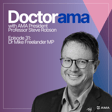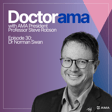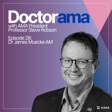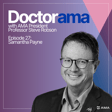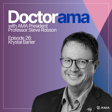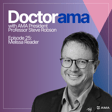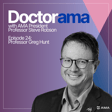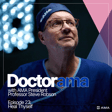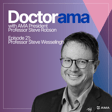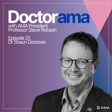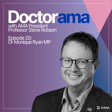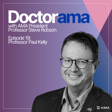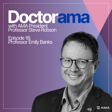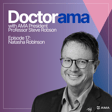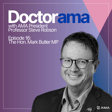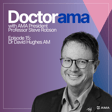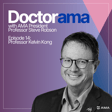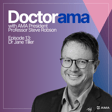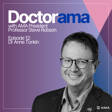Become a Creator today!Start creating today - Share your story with the world!
Start for free
00:00:00
00:00:01

Episode 9 - Kaz Cooke and A/Prof Magdalena Simonis
In episode 8 of Doctorama AMA President Professor Steve Robson chats with Kaz Cooke and A/Prof Magdalena Simonis AM.
Recommended
Transcript
Economic Impact and Pathology Debate of Menopause
00:00:00
Speaker
It's something that's going to happen to half of all Australians. In fact, it's probably affecting well over 2 million Australians as we speak. It's set to cost the Australian economy $17 billion a year. But we're not even sure whether it is truly a pathology or just a physiology.
Podcast Guests and Introduction
00:00:20
Speaker
Of course, I'm talking about menopause.
00:00:22
Speaker
And I'm lucky to have on the Dr. Rama podcast today, two of my favorite people who know everything there is to know about menopause. We're going to find out everything now on Dr. Rama.
00:00:37
Speaker
You're listening to Dr Rama with Steve Robson, bringing you the best of health, medicine and people. So I have two fantastic guests on Dr Rama today with a special episode. My first is author and celebrity Kaz Cook. Kaz, welcome so much. What did you just call me, Steve?
00:00:59
Speaker
Thank you, pardon sir. I'm an author and a cartoonist and a journalist celebrity.
00:01:10
Speaker
You have many, many hats, and we're going to talk about all of them over the course of the podcast. With me also is Melbourne Women's Health Specialist, Associate Professor Meg Delina-Simones. Welcome, Meg. Hello, Steve. Hello, Kaz. Thanks for having me. I'm very honored to be on with the pair of you. You're both so well known and so accomplished in public health. So it's lovely to be here.
00:01:34
Speaker
but we've both done our homework.
Kaz Cook's Insights on Women's Health and Media
00:01:36
Speaker
You've read it's the menopause. I think most doctors probably know me from up the duff. So this is the other end of things, really, in a way. Well, look, it's a great starting point, Kaz. I first really came across and was very impressed with up the duff, as you know. And as an obstetrician, whenever somebody asked me,
00:02:01
Speaker
What's a great book on pregnancy and birth? I said, well, look, my absolute favourite is Up the Doth because it's so down to earth. How did you come to writing in the first place? When I got pregnant, which was 1998, I assumed that it would that nine months would be me just like any other time, as if I had a basketball tucked up my front. I just
00:02:28
Speaker
didn't have any idea of how physical and how mental it was. I think that
00:02:34
Speaker
you know very few women now before they're pregnant themselves really have seen someone breastfeeding properly for example you know we used to live in communities where we handed babies around we knew what other people had gone through we knew what risks were because we'd seen other people go through them and you know no one knows better than the people involved in in the work of caring for women that
00:03:03
Speaker
You know, women and children over centuries have died for us to have this information, which then a lot of people either don't know about or are suspicious of. So as with all of my books, it comes from a position of profound ignorance. And then I try and use my skills as a journalist to go and speak to medical and other experts and also speak to women themselves because my
00:03:31
Speaker
my interest is in women's health and also my book's girl stuff for girls aged eight to 12 and 13 plus. So you know from first periods really but also body image and confidence and all those other things and I think they all go together and very often especially in the past you know women only have 15 minutes with a GP and maybe a little bit longer with a midwife or
00:03:58
Speaker
a specialist and so the more information that you can give people in a friendly trustworthy way the more they go already armed with that and that's that's kind of what I try to do and then I keep trying to up well I don't try I update the books every couple of years because I am terrified about medical information changing or getting something wrong
00:04:22
Speaker
Magda, this is a really big issue. The patients who come to see you, where are they getting their information from about everything from pregnancy to menopause?
00:04:31
Speaker
Well, that's a really good question because once upon a time it was from their communities sometimes accidentally and from their peers because a lot of information was not handed down. So in Western society, it's very unusual for mothers to sit down with their daughters and talk to them about the reality of sex, menstruation, even having babies and what it's like. So I think that even for educated women like myself,
00:04:55
Speaker
After I had my children, I thought, my goodness, who would have ever guessed that it was as complicated as all of this, especially when you have complications and you have...
Social Media Influence on Health Education
00:05:06
Speaker
babies that don't sleep through the night and breastfeeding doesn't come easily. So the information hasn't been handed down from mother to daughter traditionally very well at all, because there's been an element of secrecy and almost shame around our body parts and our bodily functions. And once women reach that sort of menstrual age, you've got to be separated away from no one's allowed to hear you talking about your menstruation, your menstrual cycle in a household, it's got to be secret.
00:05:35
Speaker
secretive. So as we've sort of got social media now, I think information, people source that from the worldwide web and from TikTok now and social media and Facebook. So I think that books like what you've written here, Kaz, that speak at the public level and at that health literacy level that the community has are really important, really valuable because
00:06:03
Speaker
What people really want, what women really want is a peer, someone that understands what they're going through and that they can share their journey with and ask, you know, what was it like for you? Am I normal? Because that's one of the big questions women come and ask a GP, is this normal? Am I normal?
00:06:20
Speaker
And I think what's really worrying is from having no information at all, we've gone to having this fire hose of information, as you say, with social media, much of it wrong, much of it guessed at, a lot of it extremely biased either by people who want to believe it or have a very strong philosophical drive to not believe doctors or not believe that any self-help
00:06:48
Speaker
you know, would be good for them. And I am just astonished at how quickly the commercial interests have got onto menopause. We've got all sorts of celebrities pouncing around the place, trying to flog us moisturizer and desiccated powders. I'm astonished
00:07:08
Speaker
at the herbal stuff and the claims made for it and the way that that is sold, even though there's no evidence for those specific formulations, compounded hormone medications that pharmacists have told me. A lot of women aren't aware that if they have a uterus and they're taking estrogen, then they need to be on progesterone.
00:07:31
Speaker
And also even some of the medical people, there's a medical doctor from the UK who's really wants people to take very high levels of testosterone as a frontline treatment. I can see Magda your eyes going, whoa. But you know, this is, it's very hard for women. How can a woman like me, you know, the lowest common denominator understand what's going on?
Humor and Sensitivity in Addressing Women's Health
00:07:58
Speaker
So that's why,
00:08:00
Speaker
I did this survey of almost 9,000 women for the menopause book and it was absolutely fascinating to see what they had to say about GPs and doctors. Kaz, when I was training to be a specialist in the 90s, you had a radio program that I used to listen to at the time and it was absolutely hilarious. I think one of the things that I really like
00:08:24
Speaker
about the books you write, particularly about the menopause book, is the humour inherent. And you're right, you're a great cartoonist and there are some great things. My favourite cartoon, I think, was about the feather in there. I'll let people who read the book see the feather one, but it made me laugh when I saw that. And a lot of humour because
00:08:48
Speaker
I think that's important to diffuse things. There's a lot of fear. When you spoke and when you surveyed the almost 9,000 people, which is extraordinary itself, I'm sure Magda has probably spoken to 9,000 one at a time over the years, but you did it all at once. Did you see fear in the responses that you got? Because I certainly sense it a bit impatient.
00:09:11
Speaker
Yeah, that's such an interesting point, because I think more than fear, there is shame, as Magda alluded to. We're talking about centuries of being told that menstruating is poisonous, and we were killing the fruit on the trees. He would have thought that menopause was going to sort us out. But no, it turned us into witches. But yes, there is so much shame about body parts, about blood, about anything that's messy.
00:09:39
Speaker
And so it is, it is, it's not easy. And I, you know, like, I have a great job, you know, writing a book and drawing cartoons is fantastic. I am not working down a coal mine. But it's tricky to, you know, in my book Up the Duff, there's a section about miscarriage in in this book, there's a section about mental, you have to be very careful about how you write about things, how you write about something like a higher suicide risk or depression or
00:10:09
Speaker
So I'm very careful with the way I write to be that friendly comes first and funny comes second, if that makes sense. But I think you're right. I think particularly I learned that when I first wrote for parents going through a pregnancy and also for parents with babies and toddlers, because, you know, it can be so terrifying if your toddler is really sick at night and it's
00:10:33
Speaker
one o'clock and you haven't slept for two nights. You don't know whether to go to the hospital or go to sleep, honestly, truly. A lot of people wouldn't understand that if they hadn't been through it. It's important to write information that gives them that clearly and quickly in case
00:10:50
Speaker
They are deciding between going to the hospital and going back to sleep.
Research and Awareness in Menopause
00:10:55
Speaker
And with menopause, it's so tricky, right, because it's more than 35 different symptoms. Not everyone gets every symptom. Some people kind of breeze through it. Some people have an absolutely terrible time.
00:11:12
Speaker
So many women in the survey said to me, like thousands, women said, I didn't know that these symptoms that I've ticked the box for had anything to do with my hormones. So menopause is in a whole class of its own, I reckon. And I think the biggest future in change in terms of research and in how to deal with
00:11:33
Speaker
with patients is going to be in menopause because we're really playing catch up. If we didn't know what hormones even were until the 1930s and then most male doctors didn't really care in terms of menopause, I think that's the big change that we're going through.
00:11:54
Speaker
And a change we're going through is exactly what we're talking about here today. Absolutely. Magda, when patients come to see you, what's the overwhelming thing that you see? Is it concern? Is it mystification about what's going on? Are people well informed? Are they finding it difficult to be well informed? What's your sense of things?
00:12:14
Speaker
they find it very difficult to be well informed. They're not well informed and they're really curious and scared. So coming back to what Kaz was saying, there's an element of fear and what they're experiencing. And also I think that some are coming in now expectantly thinking, oh, look, I'm 48. I need to have a chat with you about the menopause because I've heard all these terrible things about it.
00:12:39
Speaker
So I think one of the big reassurances that women will have or patients who go through this phase will experience is being with a doctor who shows that they're interested in listening.
00:12:54
Speaker
and saying, look, there's a spectrum of what the abnormal will be, and some of it will be mild, and some of it will be very, very disturbing. And there's a spectrum of normal also. So which part of that do you want me to deal with? So what I generally ask my patients is, what is it that you know?
00:13:16
Speaker
What is it that you've heard about and what is it that you fear and what do you need help with? So I put it back on there. I'm an open book and I'm willing to talk to them about any part of what they are experiencing, but I'm really keen to find out what their primary concern is. And for some, it really is about sleep disturbance and brain fog.
00:13:39
Speaker
and others it's really about the embarrassment of hot flushes and feeling like they're on a they're like a furnace during their working day and feeling embarrassed especially when they they hold you know roles that are in leadership and they feel really challenged by their appearance and
00:13:56
Speaker
I mean, you know, some of us have had that experience, too. You know, we literally you're wearing a silk shirt and you soak through it and you think, God, what a mistake that was. So these are experiences that, you know, women will have. So talking about all that and coming back to what Kaz was saying, when there are
00:14:13
Speaker
stories that they will share with you about the most embarrassing moments. Part of what you talk about in your book, Kaz, which I really love, is you've really singled out some of the most embarrassing situations that women have experienced and talked about in those bubbles. They're fabulous because it normalises the embarrassment
00:14:33
Speaker
And some of us just don't want to admit to that. But when we see that it's happened, it minimizes that in our own minds. And I think that that's a very important thing that you've done in the book. And that's also what GPs ideally should try to do in the setting of a clinical consultation. But our time is limited. So one of the things I encourage
00:14:57
Speaker
when I teach GPs and when I talk about this at women's health forums, et cetera, is that make the appointment once a year to have a women's health check. Especially now that we're doing cervical screening tests every five years, I say to my patients, once a year, I would like you, you're going to get a call from my office and you're going to come in and it's going to be about an hour long.
00:15:22
Speaker
And you're going to write a list of all the things that you want to talk to me about. It might be to do with your menstrual cycle, might be about sex. We're going to talk about all the women's bits and all the other bits and make a list and bring it in.
00:15:32
Speaker
Well, I think you're in danger of having thousands of people ringing you up and trying to come and see you Magda, because what I found was hundreds of women saying that they love their GP and their GP did listen to them and they felt they could say to their GP, I've got this, I'm wing when I don't mean to and it's really embarrassing or I'm having this insane periods that go on for two months and I have to sit in these meetings that go on for three hours and I can't sit for three hours, you know, I'll bleed through.
00:16:02
Speaker
And we're often told only the glamorous side of menopausal. What should you look like? And what size should you be? And all of that nonsense. So what I did in my book, and I'm so glad to hear you say that because we're really in sync here. I mean, women don't sync periods, but I think we can sync our views, Magda.
00:16:21
Speaker
And I've said, I talked to the College of GPs and they had one suggestion which was always make a longer consultation, a longer appointment. And also I've got a list of things to ask your GP so that you understand what, the GP understands what you're trying to find out and also what you might need to know, but you don't know that yet.
00:16:48
Speaker
And people had been told things by their GPs that just astonished me, like, well, what did you expect? You know, you're getting old. Well, you've just got to put up with it. It's just part of being a woman.
Partnering with Doctors for Menopause Care
00:17:02
Speaker
That won't be hormonal. You won't be going through, you know, you're too young was another thing that was said to women in their early 40s, mid 40s, late 40s.
00:17:14
Speaker
So it's not too young, and even if those women were going through it and having those sort of symptoms without a surgical reason, for example, before the age of 40, then there's a possibility there of a diagnosis for early menopause, right? So those women should be probably having investigation as well.
00:17:37
Speaker
I'm very careful in the book not to slag off doctors because I think the lockdowns and COVID has been really hard for doctors. They're overworked. They're trying to do their best. Many doctors went in the survey and said to me that they'd had no training or an hours training when they did their degree about menopause. So what I want to do also is
00:18:01
Speaker
talk to women and doctors about how to be partners in health care. And I think women of the past were often used to, I remember that phrase my nanny used to say, I'm under a doctor. How could we help you get out from under there? But you know, under a doctor really said it all, wasn't it? You know, that the information was coming down from above and you were being told what to do. So I think
00:18:29
Speaker
And I think women need to know about the risks and also the safety of hormonal medication because many of them are still being given 20-year outdated advice about the safety of
00:18:47
Speaker
MHT, which we're calling it now, and very often women have said to me, oh, I thought I was supposed to take HRT, but my doctor says I have to take MHT, like the base of information is it's, it's no one's fault, right? It's just suddenly you hit this world where you have to know all this
00:19:06
Speaker
extra stuff and that's why I love the quotes in the book and especially all the optimistic and kind ones and the ones about freedom, about the menopausal time of your life having positive aspects as well because
00:19:23
Speaker
And someone had a whack at me the other day saying, oh, these books just encourage people to think that menopause is going to be a terrible nightmare and they'll have a terrible time. But I'm not trying to do that. I'm just saying, if you have and I deliberately say, don't read this like a novel because all these things will happen to you.
00:19:42
Speaker
And so I feel that if we can give everyone a little bit of slack and try and learn it together and investigate things together, things could get a lot better a lot quicker.
00:19:56
Speaker
Cass, the approach you took of asking almost 9,000 women what was important to them and to engagement of the dialogue is a really unique one for doing something like this. Did you, first of all, was it difficult to get people to respond? And secondly, were they forthcoming when they did respond? Oh my God, Steve, were they forthcoming? I mean, you know,
00:20:23
Speaker
I tell you, nobody was backward in coming forwards. Some of them were very cross indeed about even being asked because they hadn't had any symptoms, not even rage when you shut up and then go off into capital letters in the response.
00:20:41
Speaker
I think I've got enough of a track record now that I think people trust me. And I said to them, I'm not going to use this information for anything else. I mean, people were telling me about their sex lives. They were telling me what was happening at work. That was a lovely feeling. I actually cried sometimes reading people's experiences. And I did laugh at the poor lady who told me that there was no need to write the book because if people just ate a lot more yellow vegetables, they wouldn't put them in a pause.
00:21:10
Speaker
We don't know what we're all bothering about, Magda. You could go home. So, yeah. And I made it very open-ended, you know, tell me about this, you know, what has been your experience. I don't claim, and would never do, that it's a scientific survey.
00:21:29
Speaker
I was very interested in some of the statistics that of course cannot be extrapolated to, you know, a whole population or anything like that. But it was really fascinating to me to find that, you know, you find things that come up again and again, even though you didn't ask a question about it. And that's when you know that there's something that you didn't know.
00:21:51
Speaker
So, for example, a lot of women said they'd withdrawn from their friends during perimenopause as part of the lowering of self-esteem. The phrase, I don't feel myself, I don't know who I am anymore, that was really, really common, very interesting. And also the phrase, and I'm very much hoping you have an editor because I'm going to swear now, lots of variations on the phrase, I have no more s*** to give.
00:22:19
Speaker
People had none of them, they had few of them, they'd run out of them. I did not ask a question with that wording in it, but that was very, very common. So yeah, and then I reckon there were, this is just a little side note, but there were about seven people who said they'd lost confidence in their driving abilities. So these are things that when you can put them in a book like this, in those speech bubbles, as Magda was saying, you go, oh, that happened to me too. It does totally,
00:22:49
Speaker
normalise it. Yeah, look,
Holistic Approach to Menopause Treatment
00:22:53
Speaker
absolutely. And I think the book has got a lot of those quotes in them that are just absolutely fantastic. I'm going to ask a really basic question. When you see a patient, do you treat menopause as a physiological event or a pathological problem? Or do you, you know, what's your approach?
00:23:16
Speaker
I treat it as a part of life. So it's a journey of life. So we talk about it's a physiological event and it's pathological only if it's interfering with their ability to do the things that they want to do. So whether or not they can have sex or whether or not they can participate in social
00:23:33
Speaker
activities, whether or not they're having urinary symptoms that are really bothersome. That's when it becomes a pathology. And so I think that there's a really big distinction between what's a physiological process, that we're just helping women understand that these are physical symptoms and changes that will take place in the body, some of which will interfere with the way you want to do things and do things normally.
00:23:58
Speaker
And if they become really bothersome, let's talk about how we can manage those symptoms, whether it be sex, whether it be sleep, whether it be frequency of urination waking up through the night, whether it be your skin feeling terrible and creepy crawling and itchy, whether it be forgetfulness, those moments of rage that are inexplicable, like having a really short fuse,
00:24:22
Speaker
The other thing I always try to do is see the woman in the context of her life and her family and her situation. Because a lot of the time, women at this age are also juggling, you know, a husband or a partner who may be going through some sort of crisis of their own or who might have a cancer or who's unhappy at work.
00:24:47
Speaker
or the marriage might be on the rocks. They might have teenagers or young adults still living at home going through their crazy phases and being really obnoxious. And they have really big jobs. Kaz laughed at that. Yeah, well, you know, these are phases, they're normal things. And when adults in a house, there are lots of personalities that can change. I'm not laughing at it, Magda, I'm laughing with it. Yeah, yeah, yeah, I know, yeah, I know.
00:25:12
Speaker
So we're looking after elderly relatives. Elderly relatives, that's right. So you've got a heck of a lot happening at the same time. So get the whole picture. And that's the beauty of being a GP, where you do have that continuity of care. That is where you say, so how's Jack going? And how's Eliza going? Is she in BCE now? And then you find out the whole situation, what's going on there.
00:25:37
Speaker
And then you address all of that in the context of what she's going through. So some of it is going to be life, some of it's going to be physiological. It is a chapter in life. And I think that there's really, it's just so important to take that journey with them.
00:25:54
Speaker
So, one of the things that you do, Kaz, you're a hand holder. That's what you do in your books. You hold the hand of the reader through that journey. You're saying, I understand you and I care for the way you're feeling because I actually understand it, or I've met others that feel the same way. And having that, not feeling alone. So, I think it's really important for the GP to make
00:26:17
Speaker
the woman not feel alone. And that this is not a one-stop consultation. This is a series of consultations. And this might be, you know, coming back to what you were saying about, you know, the misinformation that doctors have received. Yeah, you know, the world, the Women's Health Initiative in 2002 really massacred, you know, the lives of a lot of women. You know, for 10 years, we were not prescribing HRT. MHT shows my generation.
00:26:46
Speaker
But we were told that it was very risky, even though those of us that were pretty informed knew that it was a poor study and that a lot of what they presented was presented in a particular way that was not
00:27:05
Speaker
not valid, but it influenced women. It influenced the world. And we had a lot of depressed, unhappy women in the community who were seeking anti-depressant therapy.
Misinformation and Hormone Therapy
00:27:17
Speaker
rather than MH2. Yeah, and one of the things that a lot of women said was they'd gone to their GP with classic perimenopausal symptoms and been put on antidepressants, not because they were being prescribed antidepressants for hot flushes because they couldn't take hormone medication, but because it hadn't occurred to the doctor. But I think that is changing. And another thing I think is so important, what you're saying is that
00:27:44
Speaker
Women want to trust their doctors. And I think if doctors can play a huge role, not only in diagnosis and keeping up with the latest medications and the latest treatments, but in being kind when they say to women who will come to them and say, I don't want to take drugs, I just want something natural.
00:28:04
Speaker
So having that conversation that you're just a little bit like with insulin, that you're in diabetes, that you are replacing a hormone into the body, but you only do that if there's a symptom that you want help with. And not saying to them, well, you're stupid if you take that herbal thing, but explaining why there are no studies that actually back that up to
00:28:31
Speaker
make a significant change in hormone levels and I think understanding that people bring a philosophy into the doctor's surgery and they don't understand
00:28:44
Speaker
how to unbend themselves from that philosophical position. And I think it's the same with people going, I mean, women have said to me, I want to go on MHT because I don't want to look so old and I don't want my hair to go gray and I want to stay thinner. And I go, you know that MHT doesn't do any of that and they are
00:29:07
Speaker
astonished. So I think it's not helpful to go, and of course some women don't want to or can't take MHT, but I really would say that women who have GPs that they can trust
00:29:23
Speaker
They are so appreciative. They love those doctors. And for the other women who've been to a doctor who says, oh, you know, just put up with it. I'm not interested in talking about it. They very often don't go back to the doctor at all. It's very, very clear that Magda and I are very big pans, not only of the It's the Menopause book, which is just terrific, but all of the books around the various topics that you've done.
00:29:50
Speaker
And I'm going to wrap things up here by asking each of you, what's the key, I'll start with you Kaz, what's probably the key message you'd like people to take about menopause after all of the effort you put into the book? What do you think is the key thing? That it's different for everybody and everyone deserves knowledge because it is power. Absolutely. Magda, what's your key message for women struggling with the symptoms of menopause?
00:30:19
Speaker
to seek information really from a caring GP who knows about it, or from Kaz Cook's book. Yeah, absolutely. Absolutely. At one on this, it's a fantastic book. Kaz Magda, thank you both. I know you're both incredibly busy. I'm extremely grateful that you've taken the time to speak with me this afternoon on Dr. Rama. Thank you.
00:30:51
Speaker
You've been listening to Dr Rama, a podcast produced on Ngunnawal country by the Australian Medical Association. All rights reserved.
